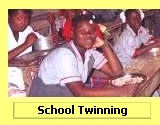 |
Contact usUnited CaribbeanDisaster Mitigation
Community Empowerment
Disaster Action Kids Club
The Body of Christ
|
home >> united caribbean
trust  UNITED
CARIBBEAN - disaster prepardness
UNITED
CARIBBEAN - disaster prepardnessNatural disasters are costing governments throughout the world unprecedented amounts of money for relief aid and repairs to property. Extracts below from Mr Coolymore speech "Managing Tropical Storms" compliments of CDERA "The past year was also marked by a number of floods and landslides affecting several islands and causing considerable damage to infrastructure and the social and productive sectors. Barbados, Dominica, Saint Lucia, Saint Vincent and the Grenadines, Jamaica, Trinidad and Tobago suffered varying degrees of damage from these hazards. The November mudslides in Trinidad and Tobago also resulted in the deaths of two (2) persons. Preliminary assessments and analyses , conducted by ECLAC and the OECS, estimate the value of damages and losses at more than US $5 billion. The total losses sustained in Grenada has been estimated at US $889 million (212% of GDP), Jamaica US $580 (8% of GDP), Bahamas US $551 million (10% of GDP) and Dominica US $3.3 million (12.5% of GDP). The impact on the social sectors has been especially substantive. In the case of Grenada, over 90% of the housing stock was damaged or destroyed, the agriculture sector was virtually wiped out and tourism, the major economic engine, suffered extensive damage and disruption. Economic losses have been estimated at US $481 million in the housing sector, US $37.4 million in the agricultural sector and US $150.4 million in the tourism sector. The very high level of losses in the social and productive sectors should raise significant concern. They clearly indicate that our development interventions are not fully embracing available risk management practices. These clearly suggest policy and behavioral gaps which are impatient for attention. Given the nature of the impact scenario I have just described, it is essential that the opportunity be taken, by all stakeholders in disaster management, to examine the realism of our planning, the efficacy of our response systems and the efficiency and effectiveness of our relief interventions." Integral to the Caribbean’s disaster management challenges are the large numbers of the population who live in areas prone to natural disasters; much, however, can be done to minimize property damages from weather events. One solution to the problems plaguing the building industry in the Caribbean region – primarily, vulnerability to the forces of nature, including hurricanes, earthquakes, termites, rot and fire- is the utilization of alternative building systems engineered to withstand nature’s forces. Another issue for homeowners is the cost of insurance, as insurance costs have sky-rocketed in areas hit by Hurricanes Luis, Marilyn, Bertha, George and Mitch. As a result of these weather events, many homeowners have been unable to insure their homes; Ivan will most likely leave many insurance companies bankrupted. Upper end homes, with larger budgets for construction, have been built to withstand some of the forces of nature. Middle income homes tend to be built to a lesser standard, due to budget constraints, and therefore, this sector appears to suffer the most damage. Those who could least afford it, are usually those most seriously impacted by tropical storms. One solution to the aforementioned challenges, is The Building System, an alternative housing solution that has been engineered to withstand hurricanes, and can be used for a broad spectrum of housing needs, from low-income housing to luxury vacation homes. Additionally, several insurance companies throughout the
Caribbean have introduced reducing rates for homes that meet engineering
standards for hurricane resistance. As island nations seek to rebuild and protect themselves from future storms, it is imperative that we analyze existing building practices and seek solutions to past problems and in this case, The Building System is an affordable way to achieve these goals. Homeowners will save money in the short run from reduced insurance premiums and in the long term, will own a home capable of withstanding hurricanes and earthquakes. We can envision a future for our islands where a hurricane is simply a natural phenomena, not a natural disaster. Hurricane Lenny launched a surprise assault on the entire Caribbean the third week of November, 1999. In addition to being a late-late season storm, Lenny defied the prevailing laws of nature by traveling from west to east. This nimble trickster managed to inflict damage from Aruba to Puerto Rico, continuing east to Antigua and touching shores as far down island as Grenada and Barbados. We are pleased to report that there was no damage to any Building System buildings from Hurricane Lenny. They have never lost a roof anywhere in the world! The potential to generate the funds required to enable the continuation of quality humanitarian efforts along with the establishment of educational, health and socio-economic sustainable development programmes, has aligned United Caribbean with a registered Grenada-based company that is currently seeking growth partnerships and investment allies to introduce ‘The Building System' to the agencies responsible for the reconstruction and redevelopment of Grenada and other interested territories. |
|
|
As a Dealer, the company will be granted exclusive territory
for the Tri-Island State, initially, and will be entitled to commissions
on all ‘Building System' products sold. The Building System is described as the best panelized building system designed for constructing hurricane and earthquake resistant homes in the Caribbean Basin and Latin America. The system is also ideal for completing large projects on tight schedules and budgets, such as housing projects, schools, hospitals and clinics, government offices and resorts. Dealerships are awarded to building professionals who can demonstrate the ability to learn new building technology, produce a quality finished product and "make it happen". Dealers are required to construct a model that displays the products. The model can be a home or a sales office/ residence for the Dealer, which will demonstrate this revolutionary new concept to an industry that is slow to change and showcase the system’s many advantages. This construction will become part of the United Caribbean's headquarters at Cassada Bay and will lead the way in hurricane resistant resorts. |
| Copyright © 2022 www.UnitedCaribbean.com. All rights reserved. Disclaimer Click to Contact us |







